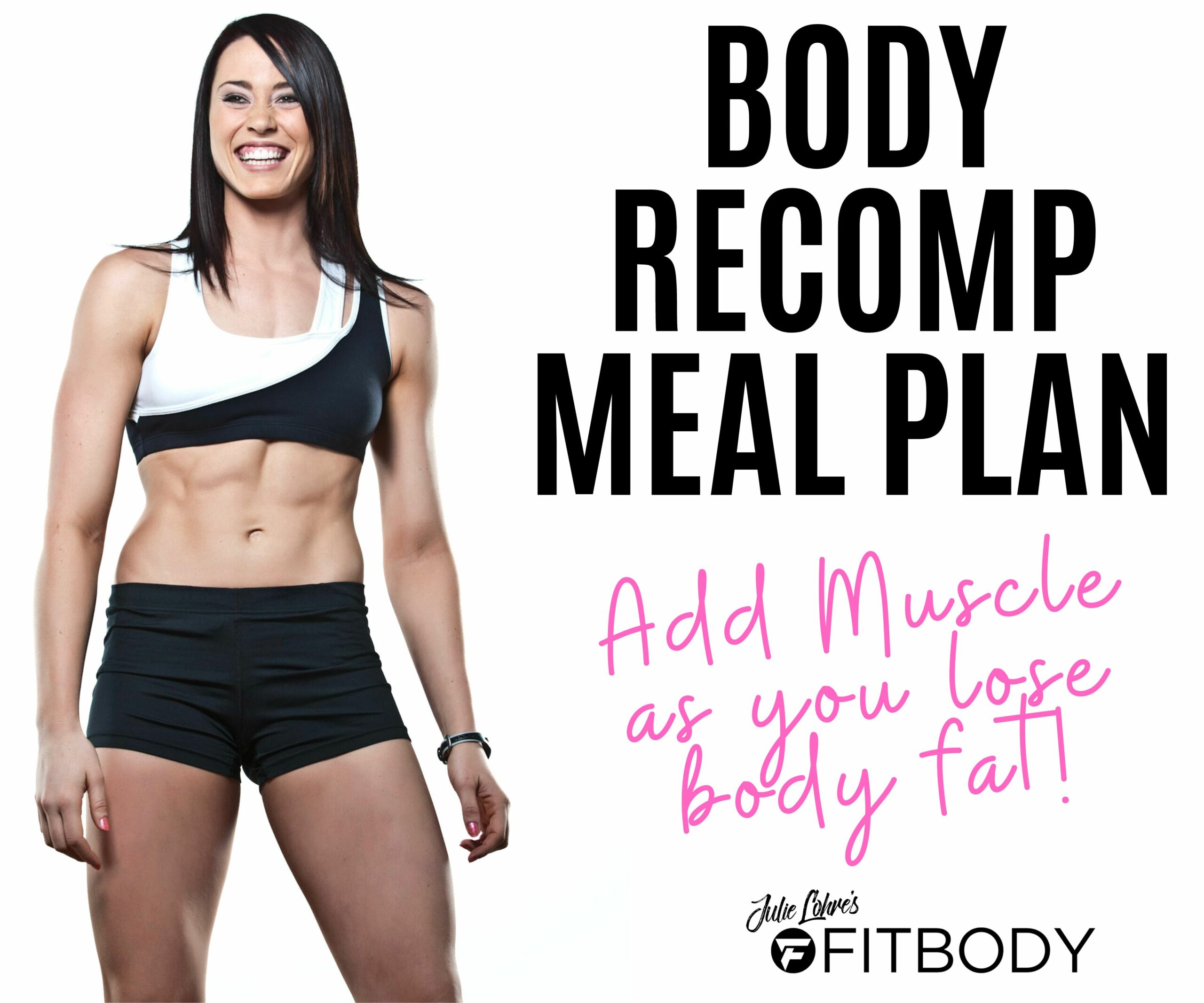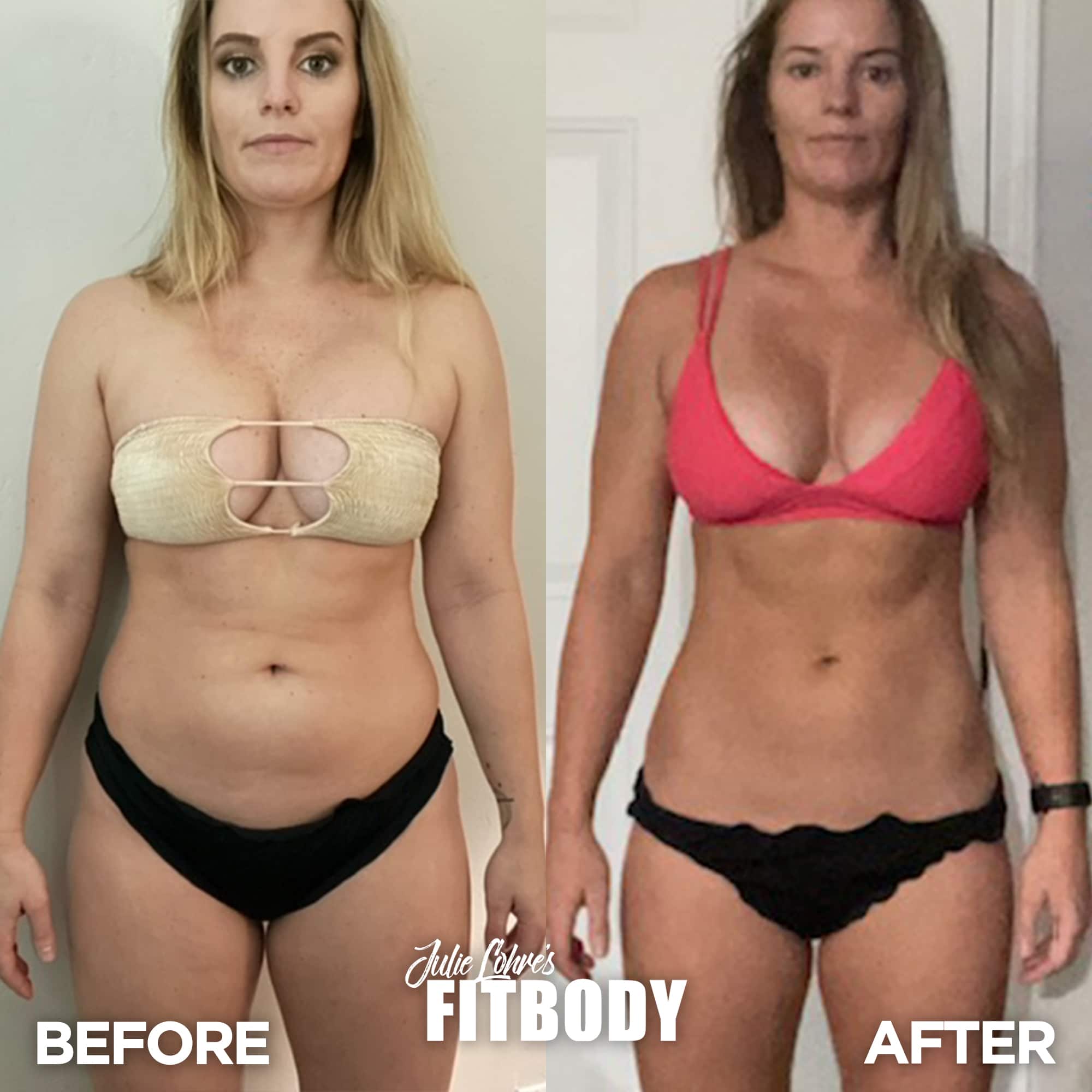Body Recomposition Diet Demystified: Achieve Your Dream Physique with my Body Recomp Meal Plan for Women

Are you looking to achieve your ideal body composition by simultaneously gaining muscle and losing fat? I work with women everyday in my Online Personal Training program that are looking to lose fat as they gain muscle for a lean and shapely FITBODY. After more than 15 years, working with thousands of women exclusively online, I have a unique perspective on the matter and have learned some secrets that will help you on your recomp journey. The key to success lies in a well-balanced meal plan that incorporates the right macronutrient ratios. In this article, I will explore the importance of macronutrients in your body recomp meal plan, how to determine your protein needs, the ideal ratio of fats and carbs, and meal frequency for optimal body recomposition.
Body Recomposition Diet Demystified
Finding the Right Macronutrient Ratios:
To achieve body recomposition, it’s crucial to strike the right balance of macronutrients – carbohydrates, proteins, and fats. While there is no one-size-fits-all ratio, a balanced approach has proven effective for most women that workout.
Carbohydrates: Your Energy and Muscle-Building Body Recomp Diet Ally
Contrary to popular belief, carbohydrates are not the enemy when it comes to body recomposition. In fact, they play a crucial role in sparing protein and enhancing muscle-building effects. While keto type-diets might be all the rage, they are simply not the best way to lose fat while gaining muscle. Instead, I recommend a starting point for macronutrient distribution is 30-35% of total calorie intake from carbohydrates. Including complex carbohydrates, like whole grains and vegetables, can provide sustained energy throughout your fitness journey.
Proteins: The Building Blocks of Body Recomposition
We all know that protein is essential for muscle repair, growth, and maintenance. In fact, I have a whole FITBODY Podcast dedicated to the subject. It also boosts metabolism and promotes satiety, making it a valuable component of your meal plan. Aim to consume around 30% of your total caloric intake from protein to support your body recomposition goals. This will help you increase muscle mass while reducing body fat.
Fats: Nourishing Your Body and Supporting Hormones
Don’t shy away from fats in your diet if your goal is to lose fat and gain muscle. Healthy fats, such as those found in avocados and nuts, are essential for overall health and hormonal balance. Including 30-40% of total calorie intake from fats can help optimize your body recomposition journey and maintain hormone levels.

Finding Sustainability in Your Body Recomp Meal Plan
Remember, sustainability is key when it comes to nutrition, but especially with a body recomp diet plan. Tailor your macronutrient ratios based on your individual preferences and needs. Experiment with different ratios to find the one that works best for you and is sustainable in the long run.
Meal Frequency and Its Impact on Body Recomposition
The frequency of meals is a matter of personal preference. Some people thrive on three square meals daily, while others prefer smaller, more frequent meals. The key is to ensure that you’re hitting your calorie and protein goals while prioritizing nutrient-dense foods. I like to look at nutrition across the whole day rather than meal by meal. We need to get in the right overall calories and a balance of macronutrients to really see progress, but it is important to honor your natural hunger. Don’t force yourself to eat, but do not go so long between meals that your blood sugar dips and you are starving.


Dispelling the Myth of Meal Frequency and Metabolism
There has been an ongoing debate in the fitness world about how meal frequency affects body composition, but limited research supports the idea that eating more frequently boosts metabolism significantly. Instead, focus on meeting your macro and calorie goals consistently throughout the day.
Listen to Your Body and Stay on Track… Going 4 to 5 hours without eating doesn’t automatically trigger a “catabolic mode.” As long as you are meeting your carb, fat, protein, and calorie goals with three to six meals or snacks throughout the day, you’ll be on the right track.
As you embrace your personal journey! Achieving your ideal body recomposition is a transformative process that requires dedication and patience. Remember that your body is unique, and what works for someone else might not work for you. Embrace your personal journey, listen to your body, and make sustainable choices that align with your long-term goals.
By following a balanced meal plan with the right macronutrient ratios, you’ll be well on your way to achieving your dream physique while maintaining overall health and vitality. Here’s to a successful body recomposition journey!
Body Recomposition Meal Plan for Women: Lose Fat, Gain Muscle
I have put together a sample Meal Plan for a women that wants to gain muscle as she loses bodyfat to give you an idea of what to expect when you are looking for a body recomp meal plan.
Goal: Achieve body recomposition by losing 20 pounds of fat while gaining 5 pounds of muscle.
Profile:
- Age: 45
- Height: 5’5″ (165 cm)
- Weight: 160 pounds (72.5 kg)
Sample Body Recomposition Meal Plan:
Note: This meal plan is designed for a moderate calorie deficit to support fat loss while providing sufficient protein and nutrients for muscle gain. Individual needs may vary. For a plan specific to your body, needs, and goals, reach out to Julie directly about Online Personal Training!
Breakfast:
- Scrambled eggs (2 whole eggs + 2 egg whites) cooked with spinach and tomatoes.
- 1 slice of whole-grain toast.
- 1 cup of mixed berries.
Mid-Morning Snack:
- 1 medium-sized apple.
- 1 ounce of almonds.
Lunch:
- Grilled chicken breast (4-6 ounces) with a side of roasted vegetables (broccoli, bell peppers, and carrots).
- 1/2 cup of quinoa or brown rice.
Afternoon Snack:
- Beverly International UMP Protein Shake: 1 scoop mixed with water or almond milk.
Dinner:
- Baked salmon (4-6 ounces) with lemon and herbs.
- Steamed asparagus with a drizzle of olive oil.
- Small sweet potato (or 1/2 large sweet potato).
Remember to stay hydrated throughout the day by drinking plenty of water. Additionally, prioritize regular exercise, incorporating both strength training and cardiovascular workouts to support your body recomposition journey. Always consult with a healthcare or nutrition professional before starting any new diet or exercise plan. Good luck on your body recomposition journey!
Find out more about Online Personal Training with Julie


